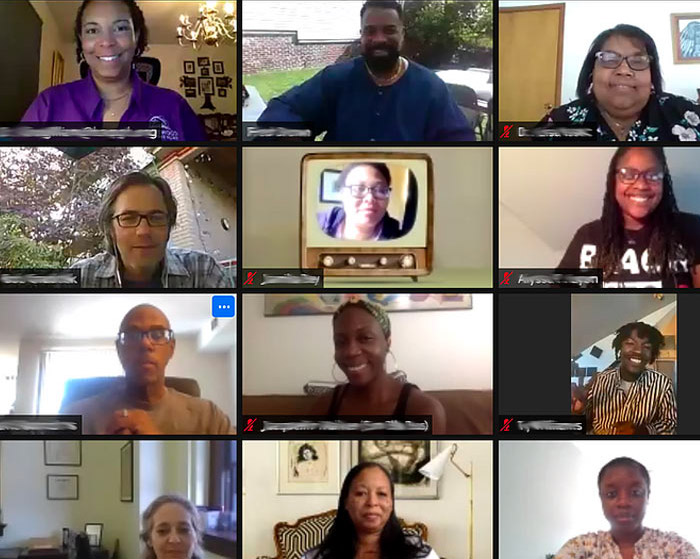The Commons
A building block of innovation is community capacity building. Part of our approach to innovating is creating a nexus for community gathering and exchange of ideas. The Commons is a digital space for such interactions and a tool for consensus building.
01
Measure to Manage
02
Identifying Key Players
03
Maximizing Community Participation
04
Optimizing a Community Dashboard
05
Give Voice to the Community
The goal of The Commons is to achieve equitable distribution of shared resources as found in a true communal space. Furthermore, creating a dashboard for commonality and digestible information that is sharable to public officials will provide a conduit for representation and implementation of the goals of communities and the nonprofit sector.
The Commons program incorporates a multilayered process for discovering insights to create more impactful, community-oriented outcomes. We begin by refining our work in communities in which we already have a prominence. The purpose behind selecting these communities is their optimal positioning for receiving external investments and taking part in community planning efforts.
In the initial community meetings, the purpose for convening will be establishing a collective of stakeholders and conducting a SWOT analysis for responding to and collecting neighborhood data.
In other words, these communities are situated to provide meaningful input regarding the use of resources. For the pilot year of The Commons, community teams will establish goals, a timeline, data collection, and dashboard management in collaboration with one another. The Commons is meant to serve as a tool for prioritizing place, prosperity, connection, infrastructure, wellness, and much more as part of these conversations and planning efforts.

Measure to Manage: Use a community-based participatory approach
Identifying community strengths and challenges to conjure sustainable and equitable solutions.
Identifying Key Players: Locate and correspond with agencies and actors who can effect the changes desired by the community.
For example: Adherence to the United Nations Sustainable Development Goals and overlapping Social Determinants of Health in Pittsburgh.
Maximizing Community Participation
Leveraging technology from partner developers at Carnegie Mellon University to boost access and engagement across communal decision making.
Optimizing a Community Dashboard: Developing a representative resource that prioritizes the preferences and plans in an engaging and accessible way
Going beyond a transaction or deficit-based approach to highlight strengths and imperatives of the community, providing constructive policy recommendations for community planning.
Give Voice to the Community in tangible ways: Applying a cross-sectoral lens to display an all-encompassing view of community needs and a clear roadmap for addressing them.
Ecodistrict protocol implementation: formation, roadmap creation, tracking performance, utilization of ecodistrict framework to co-create.
Frequently Asked Questions
Launched December 21st, 2020, The Commons has received a number of questions that are made accessible below. Please get in touch should you have any additional questions.
Why use The Commons as a resource?
- The model can easily be integrated into existing processes. For instance, if a neighborhood group already has standing meetings, they can infuse their minutes, action items, etc. into the dashboard for seamless uptake and information-sharing to other stakeholders.
- The readily accessible dashboard can speed up processes by providing an on-demand information repository.
- The technical expertise of The Forbes Funds and partners is made available.
- The Commons allows for a broader range of voices to be included at the table.
- Optimizes collaboration across community groups, neighborhoods, and beyond.
How does this program differ from other cross-community and community-based leadership approaches?
In many cases, community meetings are well-intentioned and meaningful, yet they lack quick turnaround of the tangible takeaways and action steps that lead to implementation. By creating timely data visualizations and a manageable resource, The Commons aims to be a strong point of reference for community groups in their day-to-day efforts.
What if there are various representative community groups in a given neighborhood?
The intention of The Commons is to bring in all relevant parties if possible. The beauty of The Commons dashboard is that it allows all affiliated groups to conduct their regular business and have it represented on the dashboard for other groups to see without requiring additional meetings or collaboration.
Would The Forbes Funds manage the community database and dashboard?
The Forbes Funds, in partnership with professionals from Carnegie Mellon would be doing the initial population of the database. Once The Commons is up and running, community groups will ideally be able to take on this task in-house after TFF gets a better understanding of the type of support needed for community groups to take it on themselves.
What is The Forbes Funds/The Commons looking for from people who are not community representatives?
Issue-based community leaders are value-added for their specific focuses and ability to contribute in meaningful ways as defined by participants of The Commons.
Grow and evolve, together
The Forbes Funds has a systematic process toward boosting community engagement, organizational impact, and efficiency. The Ecodistrict framework and The Commons approach to community asset-mapping and strengths-based community involvement toward achieving United Nations Sustainable Development Goals (SDGs) and Social Determinants of Health (SDOH) as an innovative, targeted, and dynamic solution.

Hi, I’m Olivia Benson and I am the Chief Operating Officer of The Forbes Funds and Greater Pittsburgh Nonprofit Partnership. A proud nerd, I have a BS in Policy and Management from Carnegie Mellon University, an MBA from Point Park University, and an MS in Social Policy from the University of Pennsylvania. In my roles, I am responsible for managing C3 work and Human Centered Design Work, including organizational development, coalition building, project management, public and community relations, and policy analysis among other things.
Professionally, I have been recognized as a social innovator in civic engagement, diversity in elected office, and social impact policies. I have a proven record in promoting advocacy causes, social entrepreneurship, and community-building for social change. I helped co-found She Runs SWPA, which is an initiative that encourages more women to run and get elected to public office, and consider this one of my proudest accomplishments by far.
